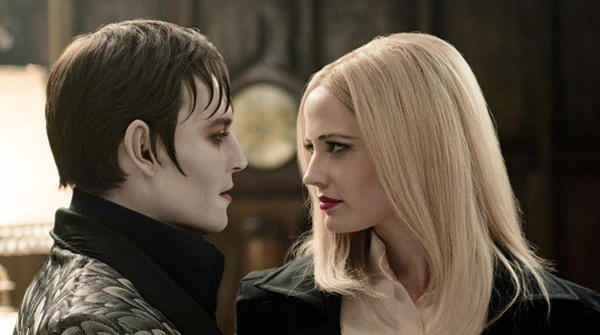Movie review by Greg Carlson
The eighth collaboration between Tim Burton and Johnny Depp, “Dark Shadows” ranks much closer in corporatized sheen to “Alice in Wonderland” than the exuberant labor of love “Ed Wood.” With its massive budget and gorgeous production design directly at odds with the legendary thrift and grind of the 1,225 episodes of Dan Curtis’s 1966-1971 daytime soap opera, “Dark Shadows” operates more like a parody or burlesque than a reverent homage. Burton, who has been accused more than once in recent years of straying from the intensity and conviction of his most personal projects to deliver lukewarm adaptations of established properties, is running on Gothic autopilot.
Jonathan Frid’s Barnabas Collins didn’t appear until a year into the original run of “Dark Shadows,” but the popularity of the character defines the series for its devoted cult of fans – most of whom are over the age of forty. Depp’s take on the vampire is regal, foppish, and tuned perfectly to the actor’s gift for comfortable femininity. The actor’s choice to surgically remove any trace of heterosexual libido neuters an acrobatic sex romp between Barnabas and his rival, but it does add a twisted deviance to an eyebrow-raising scene in which Helena Bonham Carter’s boozy psychiatrist fellates the nosferatu partially out of professional curiosity.
The jokes derived from Barnabas’s reactions to a strange new world run the gamut from shameless product placement (an entire set-up and payoff built around the iconic Golden Arches of McDonald’s) to dated gender misidentification one-liners aimed at Alice Cooper, who doesn’t look a day over sixty even though he is playing himself at age twenty-four. Depp’s cool detachment never strays too far from a diligent mock seriousness that sells quips about the quality deficit of “Scooby-Doo” (“This is a stupid play.”) and the magic of television (“Reveal yourself, tiny songstress!”). As ever, Depp is game, but he cannot overcome the movie’s fundamental lack of interest in the moral consequences of Barnabas’s curse; the vampire’s multiple murders are treated as incidental.
Aside from Depp’s comic timing, “Dark Shadows” has little to recommend it. Windy expository voiceover narration that drains away the wonder and sense of discovery, a gallery of sketchy personalities identifiable by single traits, flashback digressions, and a convoluted “eternal love” triangle thread that ignores the attraction Barnabas should feel toward Bella Heathcote’s Victoria Winters conspire to bog down the grating central conflict in which spurned witch Angelique Bouchard (Eva Green) simultaneously plots to win the affections of Barnabas and destroy the Collins family business. The climax, a screechy showdown with police officers, firefighters, angry townspeople, flames, blood, a werewolf, a ghost, and an attempted suicide is even messier than it sounds.
Getting to that tornado of an ending should be half the fun, but screenwriter Seth Grahame-Smith – the “why didn’t I think of that?” scribe who pocketed a sizable fortune from his bestselling public domain remixes “Pride and Prejudice and Zombies” and “Abraham Lincoln, Vampire Hunter” – toggles clumsily between the “Rip Van Winkle” gags of two-century old Barnabas reacting to the modern wonders of 1972 and a pile of half-baked subplots competing for time (the “Dark Shadows” one-sheet poses nine figures, and technically, Heathcote plays two characters). The more-is-more bloat utterly fails to coagulate and viewers will be hard pressed to remember many specifics by the time the credits finish rolling.
